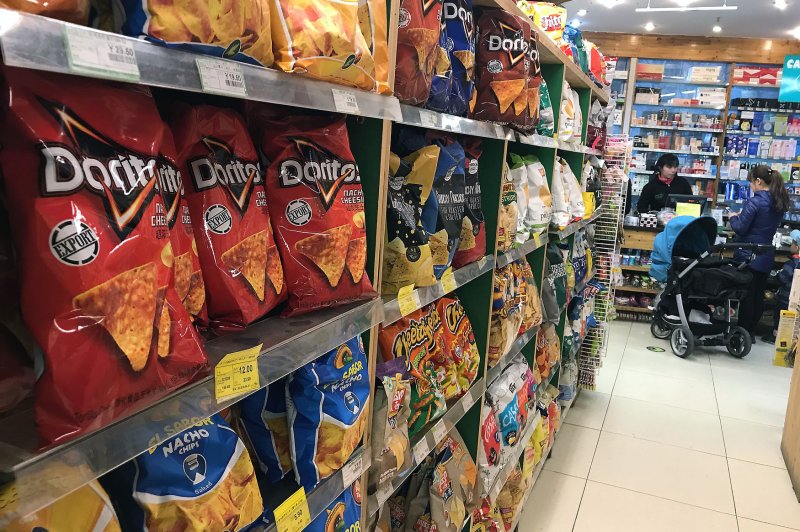
Foods and drinks advertised to children still feature unhealthy options, according to a new report. File photo by Stephen Shaver/UPI | License Photo
April 5 (UPI) -- More than one-third of food products advertised to kids, such as sugary cereals and sweet snacks, are not considered healthy dietary options, a report released Tuesday by the Rudd Center for Food Policy and Health at the University of Connecticut found.
Of the food products that can be advertised directly to children under the Children's Food and Beverage Advertising Initiative, 37% do not qualify as healthy and do not include fruits or vegetables, the data showed.
Companies that participate in the Children's Food and Beverage Advertising Initiative still promote other unhealthy brands and products with marketing that appeals to children under age 12 years via packaging, websites, in-store displays and sponsorships, the researchers said.
In addition, young people ages 12 to 17 years are not protected from marketing under the current guidelines, and companies still can advertise brands directly to children, even when the majority of products offered by those brands do not meet nutrition criteria, they said.
RELATED Maker of Ben & Jerry's ice cream, other products to stop child ads
"We know that unhealthy food and beverage marketing has a profound effect on kids' diets and health," report co-author Melissa Jensen said in a press release.
"The Children's Food and Beverage Advertising Initiative must address loopholes and apply stricter standards in order to make meaningful improvement," said Jensen, a post-doctoral fellow at the Rudd Center.
The Children's Food and Beverage Advertising Initiative is a voluntary program enacted in 2006 that is designed to establish standards for food and beverage product advertising and marketing to children.
Nineteen food and beverage companies have voluntarily pledged to limit unhealthy food advertising to children age 12 years and younger.
Previous assessments of the Children's Food and Beverage Advertising Initiative have found that children still see advertising for unhealthy items such as sugary drinks, fast food, sweet and salty snacks and candy.
However, new nutrition standards for the initiative went into effect in January 2020 that established limits on calories, saturated fat, sodium and added sugars in products that could be marketed to young people, according to BBB National Programs, which oversees it.
"For nearly 15 years, the Children's Food and Beverage Advertising Initiative has focused on ensuring that foods in advertisements directed to children under age 12 meet strict nutrition criteria," Maureen Enright, vice president of BBB National Programs, told UPI.
"As the report notes, over the years Children's Food and Beverage Advertising Initiative has strengthened the program and its Uniform Nutrition Criteria in a number of ways [and] we remain committed to continued improvement," Enright said.
For this report, called FACTS 2022, Jensen and her colleagues evaluated the nutrition quality of the products allowed to be advertised to children under the initiative as of August 2020 by using a Nutrition Profile Index score.
The Nutrition Profile Index is an overall nutrition score based on the nutrient profiling model used to identify healthy products that can be advertised to children in the United Kingdom, the researchers said.
For all products on the Children's Food and Beverage Advertising Initiative's advertising list, the Nutrition Profile Index score improved to 68 in 2020, from 66 in 2017, they said.
More than three-quarters of beverages that can be advertised to children under the Children's Food and Beverage Advertising Initiative did not contain added sugar or unhealthy sweeteners, the data showed.
In addition, participating companies added healthier drinks such as water and milk to the advertising list, the researchers said.
However, to better protect children from marketing messages touting unhealthy foods, the Children's Food and Beverage Advertising Initiative should not allow drinks sweetened with added sugar and/or non-nutritive sweeteners to be advertised, they said.
The program should expand the types of marketing covered by company pledges to also require nutrition criteria for all products marketed directly to children, including on product packaging, according to the researchers.
It should also expand its child audience definition to include children up to at least age 14 years, who are unprotected under its current guidelines, the researchers said.
"While the Children's Food and Beverage Advertising Initiative's revised nutrition criteria are a step in the right direction, they fall short of what's needed to regulate the industry and keep kids healthy," Jensen said.
No comments:
Post a Comment